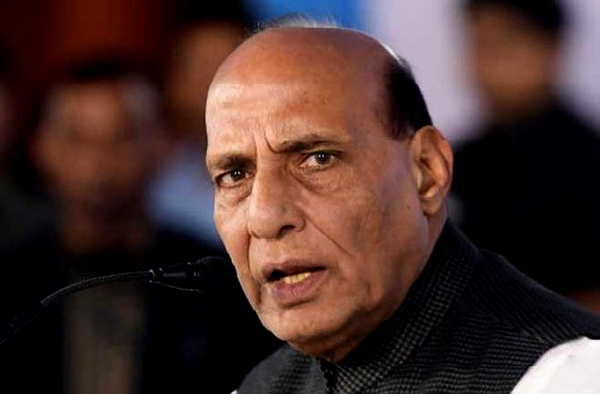Government of India took the historic decision to implement One Rank One Pension, OROPby issuing an order on 7.11.2015, benefit effective from 01.07.2014, despite huge financial burden demonstrating its commitment to the welfare of ex-servicemen.Armed Forces Personnel retired upto 30.06.2014 were covered under this Order. Keeping in view the magnitude and complexity of Defence pension, extensive consultations were held with experts and ex-Servicemen before issue of Government order on implementation of OROP.
Ex-Servicemen had been agitating for implementation ofOROP nearly for the 45 years, but the same was not implemented before 2015.
OROP implies that uniform pension be paid to the Armed Forces Personnel retiring in the same rank with the same length of service regardless of their date of retirement. Thus, OROP implies bridging the gap between the rate of pension of current and past retirees at periodic intervals.
A sum of Rs. 10795.4 crorehas been disbursed to 20,60,220 Defence Forces Pensioners/Family Pensioners as arrears on account of implementation of OROP. The yearly recurring expenditure on account of OROP is about Rs.7123.38 crores and for about six years starting from 01.07.2014, the total recurring expenditure worked out to approximately Rs. 42740.28 crore.
OROP beneficiaries also got the benefit of fixation of pension under 7th CPC while calculating the pension by multiplication factor of 2.57.
State-wise figures of amount released on account of OROP arrears as on 11.10.2019areas under.
| Sl. No. | Name of the State/UT | Number of OROP beneficiaries | Amount released on account of OROP arrears (In Cr.) |
| 1. | ANDAMAN AND NICOBAR | 380 | 2.25 |
| 2. | ANDHRA PRADESH | 47,191 | 259.64 |
| 3. | ARUNACHAL PRADESH | 2,245 | 10.42 |
| 4. | ASSAM | 35,246 | 164.14 |
| 5. | BIHAR | 73,757 | 350.96 |
| 6. | CHANDIGARH | 7,088 | 58.69 |
| 7. | CHATTISGARH | 4,289 | 25.64 |
| 8. | DADRA NAGAR HAVELI | 8 | 0.13 |
| 9. | DAMAN AND DIU | 16 | 0.08 |
| 10. | DELHI | 46,626 | 445.11 |
| 11. | GOA | 988 | 7.87 |
| 12. | GUJRAT | 17,797 | 88.79 |
| 13. | HARYANA | 1,84,126 | 909.28 |
| 14. | HIMACHAL PRADESH | 94,709 | 412.48 |
| 15. | JAMMU & KASHMIR | 62,160 | 293.4 |
| 16. | JHARKHAND | 12,915 | 62.81 |
| 17. | KARNATAKA | 60,566 | 380.76 |
| 18. | KERALA | 1,37,418 | 726.41 |
| 19. | LAKSHADWEEP | 40 | 0.26 |
| 20. | MADHYA PRADESH | 37,118 | 196.2 |
| 21. | MAHARASHTRA | 1,30,158 | 775.47 |
| 22. | MANIPUR | 4,016 | 15.64 |
| 23. | MEGHALAYA | 1,991 | 9.71 |
| 24. | MIZORAM | 1,623 | 7.12 |
| 25. | NAGALAND | 1,176 | 6.5 |
| 26. | ODISHA | 28,667 | 137.15 |
| 27. | PONDICHERRY | 1,463 | 8.64 |
| 28. | PUNJAB | 2,11,915 | 1095.44 |
| 29. | RAJASTHAN | 1,10,675 | 511.62 |
| 30. | SIKKIM | 789 | 3.63 |
| 31. | TAMILNADU | 1,16,627 | 628.77 |
| 32. | TELANGANA | 17,811 | 112 |
| 33. | TRIPURA | 1,501 | 7.66 |
| 34. | UTTAR PRADESH | 2,28,326 | 1038.23 |
| 35. | UTTARAKHAND | 1,16,553 | 530.57 |
| 36. | WEST BENGAL | 79,194 | 391.3 |
| Total | 18,67,329 | 9,638.05 |
- Above mentioned nation-wide payment details did not include the details of Nepali pensioners.
Source:PIB
You may also like
-
IAF Aircraft Set Course For Exercise Eastern Bridge VII At Oman
-
IAF Set To Host The Indian Defence Aviation Exposition-II At Jodhpur
-
Defence Secretary to co-chair 5th India-Philippines Joint Defence Cooperation Committee meeting in Manila
-
Simultaneous Launch Of ‘malpe And Mulki’, Fourth And Fifth Ships Of Asw Swc (Csl) Project
-
Aatmanirbharta in Defence: MoD signs Contract with HAL for 240 AL-31FP Aero Engines for Su-30MKI Aircraft
